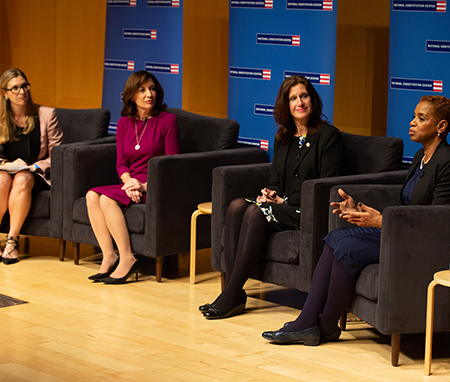In celebration of Native American Heritage Month, join experts Maggie Blackhawk of New York University School of Law; Donald Grinde, Jr. of the University at Buffalo and co-author of Exemplar of Liberty: Native America and the Evolution of Democracy; Gregory Dowd of the University of Michigan; and Woody Holton of the University of South Carolina and author of Liberty Is Sweet: The Hidden History of the American Revolution, for a conversation exploring the influence of indigenous people and tribal governments on the U.S. Constitution and American democracy, from before the Revolution to today. Jeffrey Rosen, president and CEO of the National Constitution Center, moderates.
This program is made possible with support from TD Bank.
Video
Podcast
Or, listen on Apple Podcasts or Spotify.
This episode was produced by Melody Rowell, Tanaya Tauber, John Guerra, and Lana Ulrich. It was engineered by the National Constitution Center's AV team. Questions or comments about the show? Email us at [email protected].
Participants
Maggie Blackhawk is professor of law at New York University. Her first book project (under contract, Harvard University Press) highlights the centrality of Native Nations, Native peoples, and American colonialism to the constitutional law and constitutional history of the United States. The manuscript builds upon her Harvard Law Review article, “Federal Indian Law as Paradigm within Public Law.” She also serves as an executive editor for Cohen's Handbook of Federal Indian Law.
Gregory Dowd is the Helen Hornbeck Tanner Collegiate Professor in the Department of American Culture at the University of Michigan. Dowd is a past chair of the Department of American Culture and a past director of the AC Native American Studies program. He has published several books and many articles on the history of Eastern North America from the 16th to the mid-19th century, including, Groundless: Rumors, Legends, and Hoaxes on the Early American Frontier and War under Heaven: Pontiac, The Indian Nations, and the British Empire.
Donald Grinde, Jr. is professor in the Department of Africana and American Studies at the University at Buffalo. Grinde’s research and teaching have focused on Haudenosaunee/Iroquois history, U.S. Indian policy since 1871, Native American thought, and environmental history. He has written extensively on these topics, including authoring or co-authoring books such as: The Iroquois and the Founding of the American Nation and Exemplar of Liberty: Native America and the Evolution of Democracy.
Woody Holton is McCausland Professor of History at the University of South Carolina, where he teaches courses on Colonial America and the American Revolution. He is the author of several acclaimed books, including Abigail Adams: A Life, which he wrote on a Guggenheim fellowship and won the Bancroft Prize. His most recent book is, Liberty is Sweet: The Hidden History of the American Revolution, which he wrote with the support of a fellowship from the National Endowment for the Humanities.
Jeffrey Rosen is the president and CEO of the National Constitution Center, a nonpartisan nonprofit organization devoted to educating the public about the U.S. Constitution. Rosen is also professor of law at The George Washington University Law School and a contributing editor of The Atlantic.
Additional Resources
- Maggie Blackhawk, Harvard Law Review, "Federal Indian Law as Paradigm Within Public Law"
- Articles of Confederation (1777)
- Gregory Dowd, The Journal of American History, "Indigenous Peoples Without the Republic"
- Donald Grinde, Jr. and Bruce Johansen, Exemplar of Liberty: Native America and the Evolution of Democracy
- Woody Holton, Liberty is Sweet: The Hidden History of the American Revolution
- The Stamp Act (1765)
- The Boston Tea Party (1773)
- The Cherokee Nation v. The State of George (1831)
- Worcester v. Georgia (1832)
- Elk v. Wilkins (1884)
- Maggie Blackhawk, Stanford Law Review, "On Power & Indian Country"
- Korematsu v. United States (1944)
- Trump v. Hawaii (2018)
- Gregory Dowd, War under Heaven: Pontiac, the Indian Nations, and the British Empire
- McGirt v. Oklahoma (2020)
- National Constitution Center, Live at the National Constitution Center, "SCOTUS Review: Day Four"
- National Constitution Center, American Treasures: Documenting the Nation's Founding
- John Miller, The Federalist Era, 1789-1801
Stay Connected and Learn More
Continue the conversation on Facebook and Twitter using @ConstitutionCtr.
Sign up to receive Constitution Weekly, our email roundup of constitutional news and debate, at bit.ly/constitutionweekly.
Please subscribe to Live at the National Constitution Center and our companion podcast We the People on Apple Podcasts, Stitcher, or your favorite podcast app.
To watch National Constitution Center Town Hall programs live, check out our schedule of upcoming programs. Register through Zoom to ask your constitutional questions in the Q&A or watch live on YouTube.
Transcript
This transcript may not be in its final form, accuracy may vary, and it may be updated or revised in the future.








